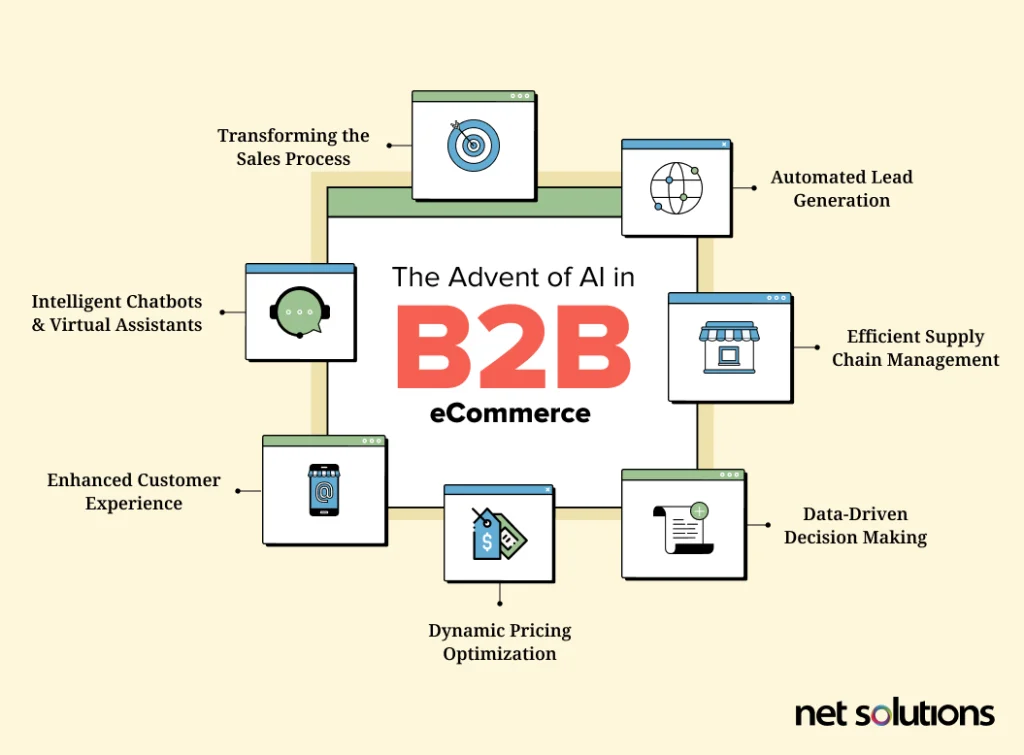Unlock Effectiveness and Development With AI Automation for B2B Business
AI automation is changing the landscape for B2B firms. It reduces and simplifies operations dependence on human treatment. This shift enables services to make quicker, data-driven choices. As organizations check out which processes to automate, they need to also take into consideration the right devices to carry out. However, challenges stay in taking on AI technology. The ramifications of these adjustments can shape the future of numerous firms in ways yet to be fully comprehended.
Recognizing AI Automation in the B2B Context
As businesses increasingly seek performance, comprehending AI automation in the B2B context becomes vital. AI automation includes using innovative modern technologies to simplify operations, lower human intervention, and boost decision-making procedures. In the B2B landscape, this can manifest in various types, such as automating customer solution communications, managing supply chain logistics, or maximizing advertising campaigns. Firms can leverage AI to analyze enormous datasets rapidly, allowing them to recognize trends and insights that educate tactical choices. Additionally, AI systems can incorporate perfectly with existing modern technologies, providing a natural platform for taking care of business features. This understanding prepares for companies to discover exactly how AI can change their operations, boost productivity, and eventually foster sustainable growth in a competitive market.
Trick Benefits of Implementing AI Automation

Determining Procedures Suitable for Automation
How can B2B business efficiently recognize procedures ideal for automation? A methodical strategy starts with mapping out existing process to identify recurring and time-consuming jobs. These jobs often consist of information entry, invoicing, and client follow-ups. Firms ought to evaluate the frequency and volume of these processes, as high-frequency jobs present the best possibility for efficiency gains. Furthermore, examining the potential for error reduction and resource allocation can highlight areas ripe for automation. Engaging staff members in discussions can also provide understandings right into which procedures hinder performance. Finally, firms should take into consideration the positioning of automation with their calculated goals, making certain that the determined procedures contribute to general service purposes, inevitably helping with smoother procedures and boosted development.

Picking the Right AI Equipment for Your Company
When B2B companies take into consideration automating their procedures, selecting the appropriate AI devices becomes essential for accomplishing desired end results. Companies need to start by evaluating their one-of-a-kind requirements and objectives, making certain positioning with business objectives. Reviewing the scalability, integration, and versatility capacities of prospective devices is vital, as these factors figure out long-term efficiency (Minarik AI). Organizations must likewise think about user-friendliness and the level of support supplied by suppliers, as these aspects can affect effective application. Furthermore, evaluating consumer reviews and study can supply understandings right into exactly how specific AI solutions execute in real-world situations. By carefully picking AI devices that fit their operational needs, B2B business can enhance performance and drive growth while minimizing possible disruptions
Overcoming Difficulties in AI Adoption
B2B business frequently run into considerable obstacles in embracing AI technologies, especially issues connected to information high quality and resistance to change administration. Poor information high quality can prevent the efficiency of AI systems, while staff member reluctance to accept brand-new processes can delay implementation efforts. Resolving these challenges is necessary for successful AI combination and optimizing its potential benefits.
Information Top Quality Issues
Guaranteeing high data quality is necessary for the effective fostering of AI modern technologies in business-to-business environments. Incorrect, incomplete, or out-of-date information can severely hinder AI efforts, causing incorrect understandings and inadequate decision-making. Companies frequently face difficulties such as data silos, incongruities throughout different sources, and a lack of standardized data layouts. To overcome these concerns, organizations should buy data cleansing, integration, and governance procedures (Growth Systems For B2B). Applying durable information administration methods guarantees that the information fed right into AI systems is pertinent and trusted. Cultivating a society of data quality recognition among employees can boost data accuracy over time. By resolving data quality problems, B2B firms can release the full possibility of AI automation, driving effectiveness and growth
Adjustment Administration Resistance
Overcoming adjustment administration resistance is important for the effective application of AI campaigns within companies. Employees usually display skepticism in the direction of AI, fearing task displacement or modifications to established operations. To fight this, leadership needs to foster a culture of visibility and continuous understanding. Offering training and clear interaction about the benefits of AI can alleviate issues and build count on. Involving staff members in the shift procedure urges collaboration and minimizes resistance. In addition, identifying modification champs within groups can help with smoother approval of AI modern technologies. As companies navigate this change, resolving functional and psychological concerns associated with AI adoption ends up being crucial for optimizing the modern technology's possible and ensuring a seamless assimilation right into existing procedures.
Gauging the Influence of AI Automation
Gauging the influence of AI automation in B2B firms calls for a clear understanding of vital performance indicators (KPIs) that align with company goals. Efficient data analysis methods are necessary for analyzing the outcomes, while durable ROI assessment strategies help determine the financial benefits of automation efforts. With each other, these parts give an extensive framework for reviewing AI's payments to business success.
Secret Performance Indicators
Key performance indicators (KPIs) offer as necessary tools for B2B business to assess the effectiveness of AI automation campaigns. By developing clear metrics, organizations can measure renovations in operational efficiency, price decrease, and income growth straight attributable to automation. Typical KPIs include cycle time decrease, error prices, client fulfillment scores, and staff member performance levels. These indications supply insights right into how AI systems are maximizing procedures and enhancing total performance. In addition, tracking KPIs allows companies to determine areas for more enhancement and to align AI automation initiatives with tactical organization goals. Ultimately, a well-defined structure of KPIs guarantees that B2B firms can quantitatively review the effect of AI automation on their procedures and drive constant development.
Information Analysis Methods
Reliable data evaluation techniques play a crucial function in reviewing the impact of AI automation within B2B business. By making use of statistical techniques, Minarik AI companies can identify trends and patterns in operational data, permitting them to assess the effectiveness gets attained through automation. Methods such as regression evaluation and time collection forecasting offer understandings right into how AI-driven processes affect productivity and decision-making. B2B Automation Consulting. In addition, information visualization tools can efficiently communicate searchings for to stakeholders, assisting in informed critical decisions. Artificial intelligence formulas can even more boost evaluation by predicting future end results based on historic data, offering workable insights. Eventually, these techniques make it possible for B2B business to measure success and maximize their AI automation initiatives, ensuring positioning with business purposes and boosting overall efficiency
ROI Evaluation Strategies
Examining the return on investment (ROI) of AI automation is important for B2B companies looking for to comprehend the financial effects of their technological campaigns. Business can utilize numerous ROI evaluation techniques to gauge the effectiveness of AI executions. One efficient technique entails computing cost financial savings by contrasting operational expenses prior to and after automation. Furthermore, gauging productivity enhancements via vital performance signs (KPIs) assists evaluate the advantages of AI. Customer satisfaction metrics can likewise offer insights into the effect of automation on solution top quality. To assure an extensive analysis, firms should consider both direct intangible benefits and financial returns, such as enhanced decision-making capabilities and competitive advantage. This complex analysis enables B2B companies to make informed decisions concerning future investments in AI modern technology.
Future Fads in AI Automation for B2B Companies
What advancements exist in advance for AI automation in B2B firms? Emerging fads indicate a significant shift towards improved information analytics capacities, enabling organizations to make more informed choices (AI Automation For B2B). Predictive analytics will end up being progressively crucial, permitting firms to prepare for market adjustments and consumer demands. In addition, the integration of AI with Internet of Points (IoT) technology is anticipated to streamline procedures by giving real-time understandings and automation of procedures. Business will additionally focus on improving customer experiences through customized advertising and marketing driven by AI formulas. Furthermore, developments in natural language handling will facilitate far better communication in between companies and customers. As these patterns advance, B2B business must adjust to leverage AI automation successfully, ensuring continual development and competitive benefit
Frequently Asked Concerns
What Industries Benefit one of the most From AI Automation in B2B?
Production, finance, medical care, and logistics industries profit one of the most from AI automation in B2B. These markets leverage AI to enhance procedures, enhance decision-making, and improve general functional efficiency, driving substantial growth and advancement.
How Does AI Automation Effect Employee Duties and Responsibilities?
AI automation improves worker roles and duties by simplifying repeated jobs, making it possible for employees to concentrate on critical efforts. This shift promotes ability advancement, boosts productivity, and motivates collaboration, inevitably driving business growth and technology.
What Are Common Misconceptions About AI Automation in B2B?
Common mistaken beliefs concerning AI automation in B2B consist of anxieties of work loss, ideas that AI can fully change human judgment, and underestimating the significance of partnership between AI systems and workers for suitable results. - Minarik AI
Just How Can Companies Make Certain Data Personal Privacy With AI Automation?
Businesses can ensure information privacy with AI automation by carrying out durable encryption procedures, sticking to regulative conformity, conducting routine audits, and training employees on data taking care of methods to minimize risks and secure delicate information. (Growth Systems For B2B)
What Are the Prices Connected With Applying AI Automation?
The costs connected with carrying out AI automation consist of software acquisition, framework upgrades, training personnel, ongoing maintenance, and prospective downtime throughout assimilation. Additionally, companies may incur expenditures connected to data safety and security and compliance procedures.
Determining the influence of AI automation in B2B firms calls for a clear understanding of key performance signs (KPIs) that line up with service purposes. Trick efficiency indications (KPIs) offer as essential tools for B2B companies to assess the effectiveness of AI automation campaigns. Reliable data analysis techniques play an important function in examining the effect of AI automation within B2B business. Reviewing the return on investment (ROI) of AI automation is important for B2B companies looking for to recognize the monetary ramifications of their technical initiatives. What technologies exist ahead for AI automation in B2B companies?